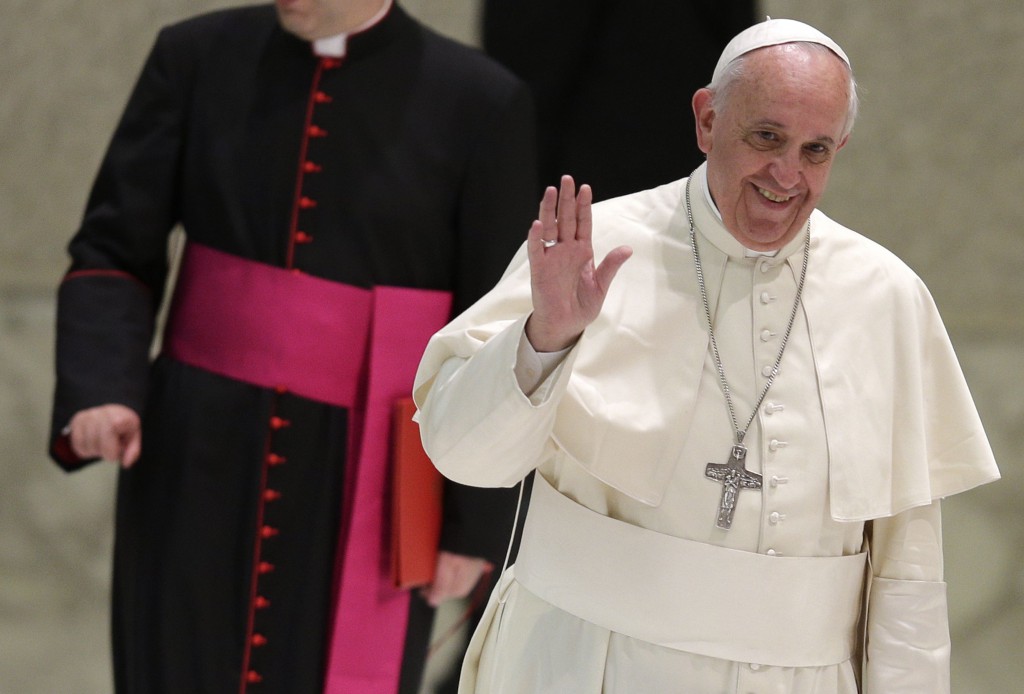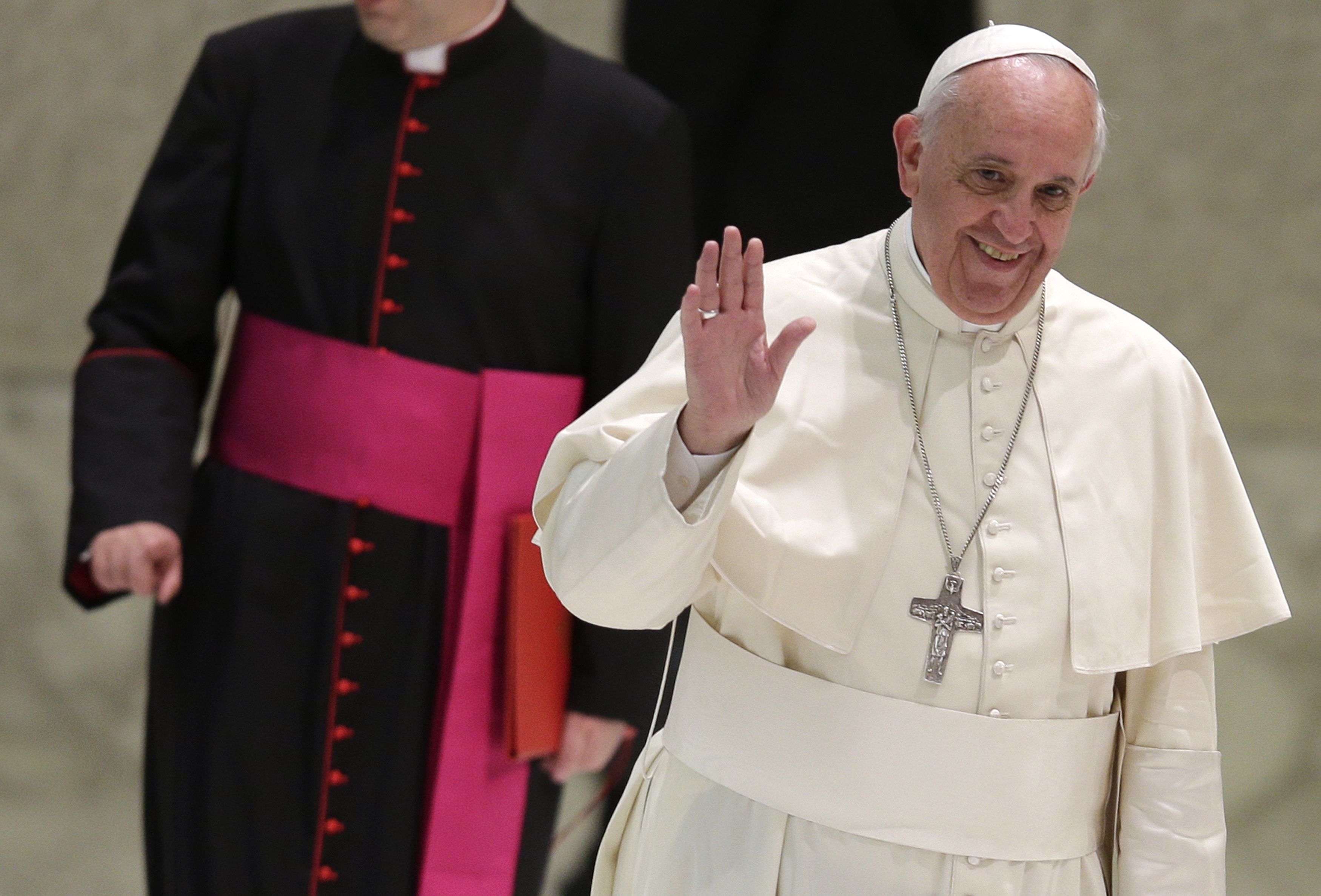
VATICAN CITY (CNS) — Pope Francis told seminarians not to become “orphan priests,” who are motherless without Mary; “businessman priests,” who are after money; or “prince priests,” who are aloof from the people.
He also warned them not to give “boring homilies,” saying their reflections should be brief, powerful and address the problems and concerns people are really going through.
In a private audience in the Vatican’s Paul VI hall with thousands of seminarians and priests from around the world who are studying in Rome, the pope spent 70 minutes answering the questions of eight pre-selected participants.
The pope told them that he already had seen the prepared questions, and urged them to feel free to change the questions and go off-script if they wanted. However, the men, who were from the United States, China, Lebanon, Cameroon, Mexico, Philippines and Poland, appeared to stay with the prepared questions.
In his off-the-cuff replies, the pope addressed questions about formation; difficulties living in a religious community; advice about being far from home and living in Rome; how to balance the many duties of being a priest or bishop; what a real leader must be; and what the new evangelization entails.
The pope peppered his serious and detailed advice with a number of humorous anecdotes and sarcasm, like when he warned the men to never forget they have a mother in Mary.
“But if you don’t want Our Lady as a mother, you will have her as a mother-in-law and that’s not good,” he said to laughter and applause.
The comment was part of a lengthy response to a Mexican student’s question about remaining faithful to one’s priestly vocation.
The key, the pope said, is vigilance — keeping watch over one’s heart and feelings, and finding peace during times of personal “turbulence.”
Just like a stormy sea, it’s impossible to see what’s going on inside one’s heart when life is in turmoil, he said.
The only way to calm the waters and be able to reflect intelligently on what’s going on is to turn to Mary for help, he said, and to “seek refuge under the mantle of the Holy Mother of God.”
“Some of you will say, ‘But Father, in this era of so many modern benefits, in psychiatry, in psychology, I think it would it would be better during these times of turbulence to go to a psychiatrist to help me.’ I’m not eliminating that (possibility), but go to the mother first before anything else.”
When there’s trouble, children “always go to their mother. And we are children in our spiritual life,” the pope said.
“To forget a mother is a terrible thing,” he said, and when a priest forgets Mary or does not have a good relationship with her, “something is missing. He is an orphan priest.”
The pope later warned against becoming a “businessman priest” or a “prince priest” in response to a question from a Filipino student about the qualities needed to best lead the people of God.
Parishioners are usually very forgiving of a priest’s missteps, except when they are sins of greed and vanity — the “two hazards” that St. Augustine warned about that come with the priestly office.
The people of God “don’t forgive you if you are a pastor who is attached to money, if you’re vain and don’t treat people nicely because the conceited don’t treat people nicely.”
He said the early monastic Desert Fathers used to say that “vanity is like an onion:” the vain keep peeling back and showing off all their layers until “you end up with nothing,” but the repelling “smell of onion.”
Instead, “humility must be the weapon of the priest,” who is close to his people and lives a life of sacrifice, poverty and service.
“There is only one path to leadership: service. There is no other way,” the pope said.
A priest can be a great communicator and have other wonderful talents, “but if you aren’t a servant, your leadership will collapse, it won’t matter, it won’t be able to summon” others or guide them.
Service is always being available to others, responding to their needs, and helping them “grow and walk” with Jesus.
When asked about the “new evangelization,” Pope Francis said it requires “going out of one’s self” and “getting closer to the people, to everyone.”
“You can’t evangelize without being close” to others, which means being “cordial” as well as being physically present and aware of what others are going through.
One of the reasons why there are so many “boring homilies” is because priests aren’t “close” to their people, he said. The measure for seeing how close a priest is to his parishioners is his homily, he added.
Pope Francis lamented long homilies, telling the students he knows the 40-minute homily “isn’t something made up. It happens!”
Homilies also should not be “about abstract things,” he said.
While it expresses “the truth of faith,” a homily shouldn’t be a classroom lesson, a conference or an academic reflection, but be “something else,” that borders on the sacramental, and is “brief and powerful.”
He said “we are late” in picking up on this problem and that the church has a lot to do to ensure homilies are under 10 minutes and done well “so that people understand” the word of God.
The pope urged seminarians to not let their academic studies take over their spiritual growth, apostolic work and community life.
“Academic purism is not healthy,” he said, and it carries the risk of “slipping into ideologies,” which harms the priest and people’s conception of the church.
In response to the challenges of living in a religious community, diocese or seminary, the pope said “gossip is the plague” and will destroy a community.
He said, it’s not true that gossip is “a female thing; men, too,” can get wrapped up in backstabbing, jealousy, envy and power struggles.
“Community life isn’t paradise; at any rate, it’s purgatory, but it’s not paradise,” he said to applause.
The best advice, he said, is to speak face-to-face with the person with whom one disagrees or has a problem or go to one’s superior for help. Also, always pray for that person “and the Lord will do the rest.”
When asked about balancing all of the demands of being a priest or bishop, the pope said the secret is prayer and always making room for the sacraments and eucharistic adoration.
The ideal day is to go to bed tired “so you won’t have to take any (sleeping) pills,” he joked.
But he underlined the difference between the “good tired” of a productive day versus the exhaustion of being run ragged.
He told his audience that he could see his papal assistant “giving me a look right now,” suggesting that the pope does not exactly follow his own advice in that regard.
“It’s true. I’m a sinner,” guilty of overwork and being disorganized, he laughed.







